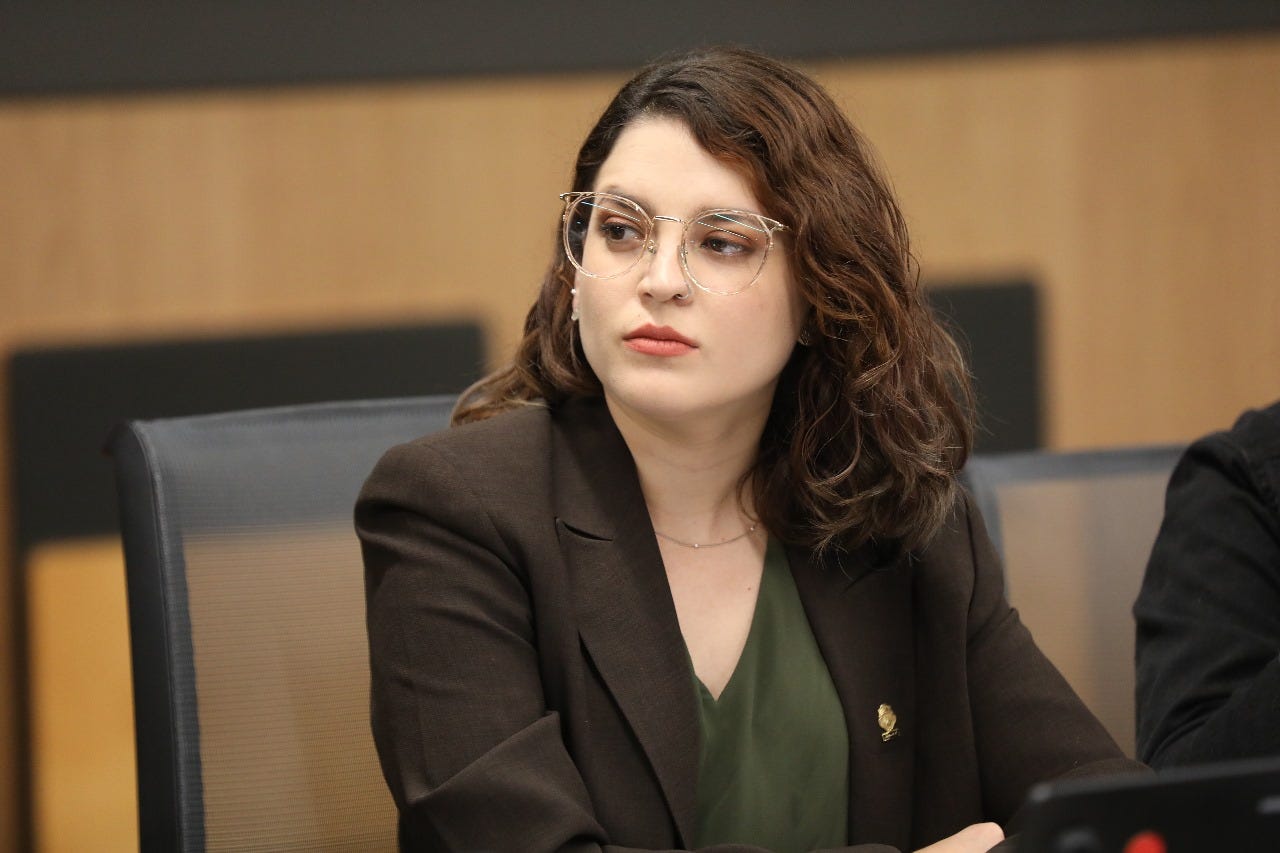This is the first issue of a two-part special on the insecurity crisis in Costa Rica.
Decoding Human Rights addresses the current security crisis in Costa Rica from a comprehensive perspective, analyzing high levels of violence, deficiencies in public policies, and the relationships between the branches of government.
Featuring: Laura Chinchilla Miranda, President of the Republic (2010–2014). She also served as Vice President, Member of Congress, and Minister of Public Security and of Justice and Grace; Priscilla Vindas Salazar, Member of Congress for the Broad Front Party and Secretary of the Legislative Assembly's Security and Drug Trafficking Commission; Ana María Guzmán Rodríguez, lawyer.
Estimated reading time: 15 minutes.
The most violent years in our history
Citizen insecurity and rising crime rates highlight the urgent need to adopt comprehensive strategies that address their multiple causes, from socioeconomic to institutional factors. This analysis seeks to explore how current deficiencies in the State responses and the lack of a coordinated national strategy are exacerbating the crisis.
What do the numbers say? The year 2023 became the most violent in Costa Rica's history, with a significant increase in the number of intentional homicides, rising from 656 cases in 2022 to 906 in that period—an increase of 250 deaths. Although 2024 saw a slight decrease, the country closed the year with a total of 880 homicides, reflecting the persistence of a serious violence problem.
I spoke with Laura Chinchilla Miranda, former President of Costa Rica (2010–2014), to understand the dynamics of the insecurity phenomenon and what current data reveals. During her administration, a significant reduction in intentional homicides was achieved through the design and implementation of the Comprehensive Sustainable Citizen Security Policy and Social Peace Promotion (POLSEPAZ).
Crime and insecurity are multifaceted issues, stemming from diverse causes. Some are socio-economic in nature, such as inequality, social exclusion, and addiction. Others are situational and instrumental, including the deterioration of communal environments and new opportunities for cybercrime. There are also legal-institutional causes, such as inefficiency and impunity due to inadequate laws or ineffective or corrupt policing and justice systems.This is why the most effective and sustainable policies are those that adopt a comprehensive approach to the problem, implementing actions across different areas with an interinstitutional strategy that engages various sectors and involves both national and subnational levels.
A clear example of this is the violence affecting young people, who are the hardest hit by this problem. According to official data, 40% of homicide victims are under 29 years old. Similarly, among offenders and those filling the nation’s prisons, young people also predominate. When examining the socioeconomic conditions of those involved as victims or offenders in homicides, severe social exclusion and deteriorated, dysfunctional neighborhood and family environments are evident.If youth violence is addressed solely through police operations to arrest offenders and impose prison sentences, without addressing the social risk factors, for every young person incarcerated, several others will emerge to take their place within criminal structures. As of February 2024, data from INEC indicated that approximately 157,000 young people between the ages of 15 and 24 in Costa Rica were neither studying nor working.
The same holds true when analyzing other types of criminal violence. Behind all these forms of violence lie various risk factors that must be addressed to curb the problem. This is particularly true in the case of organized crime, where contributing factors include financial systems that facilitate money laundering and complex transnational relationships, among others.
Currently, Costa Rica lacks a comprehensive, interinstitutional, and mobilizing strategy to ensure success in addressing citizen insecurity. While the judicial police and the prosecutor's office have done commendable work, the executive branch has been notably absent in implementing policies aimed at preventing crime, whether stemming from common or organized crime.
Laura Chinchilla Miranda
Citizen insecurity and crime are complex challenges that impact social stability and quality of life in communities. In light of this reality, it is essential to understand that implementing effective public policies requires an approach that integrates efforts across various sectors and levels of government. Historical evidence shows that well-designed and coordinated policies can lead to significant progress in reducing violence.
Insensitive and insufficient
The management of public security by the current Costa Rican government has been characterized by insensitive remarks, insufficient policies, and a clear lack of long-term strategy. Despite the severity of the violence crisis, marked by a significant rise in homicides and collateral deaths, the authorities have chosen to downplay the issue, shift blame, and rely on reactive and unsustainable measures.
They told me with good intentions: Don’t worry too much about the murders because as long as you don’t get involved in shady dealings, there’s nothing to worry about—it’s just them killing each other. And you know what? It’s true.
Rodrigo Chaves, President of the RepublicCollateral Victims of Violence. Contrary to such statements, the country’s historic insecurity crisis does not only affect gang members. Data from the Judicial Investigation Agency (OIJ), obtained through a public information request by Doble Check, revealed that collateral deaths tripled in 2023, reaching 52 victims.
Shortly before his dismissal, former Minister of Public Security Jorge Torres attempted to deflect responsibility for the wave of violence onto citizens. He also proposed a creative and dangerous mechanism to combat crime in communities:
If someone comes to your neighborhood and starts selling [drugs], why not knock on their door and tell them, ‘In this neighborhood, we don’t allow that’? Will they kill you? No, that will never happen.
Jorge Torres, former Minister of Public Security and current Director of the Intelligence and Security DirectorateJorge Torres held the ministerial position for one year without formulating a public security policy. He was dismissed after a failed plan to increase police shifts sparked unprecedented police protests in the country. Nevertheless, he was reassigned to lead the Intelligence and Security Directorate. He was replaced by Mario Zamora, who had previously served as Minister of Security during Laura Chinchilla's administration.
The First Glimpse of a Public Policy. Following this shift, the Costa Rica Segura security policies were introduced, followed by their improved version, Costa Rica Segura Plus. However, the Comptroller General of the Republic confirmed that these policies lack medium- and long-term guidelines and fail to establish formal and permanent mechanisms for reviewing objectives, priorities, and monitoring results within the security sector.
In the context of an insensitive and insufficient administration, President Rodrigo Chaves is trying to shift responsibility for the violence crisis onto the Legislative Assembly and the Judiciary.
The role of the Legislative Assembly
I obtained firsthand reactions to the Government's tendency to blame the Legislative Assembly for the security crisis and the record-breaking homicide rates of 2023 and 2024. How is this perceived from the Assembly? Is it true that the Assembly is obstructing projects or not advancing as quickly as desired? Or, on the contrary, is the Assembly fulfilling its responsibilities within its designated role?
Unfortunately, this is nothing new from this Executive Branch. The Legislative Assembly, particularly the Security and Drug Trafficking Commission, has made every effort to pass impactful projects aimed at addressing both the insecurity crisis and the fight against organized crime, while also advancing prevention initiatives. It is important to emphasize that, while this issue is a priority, it must be handled with great caution. Legislative changes in this area could, for instance, negatively impact ongoing organized crime prosecutions. The Security and Drug Trafficking Commission has demonstrated a serious and responsible attitude toward the grave insecurity problem facing our country—a standard that the Executive Branch and its representatives in Congress have not upheld effectively so far. For those governing lightly and without dedication, the criticisms made might seem personal. In reality, however, it is this branch of government that seeks to ensure a thorough and timely discussion of this pressing issue.
Priscilla Vindas Salazar
Additionally, what can the country expect from the Security and Drug Trafficking Commission (and the rest of the Assembly) for the year 2025? What important projects are being discussed?
From the Commission, we will continue working on the Execution of Sentences project, a law that has been pending for more than 50 years in our legal system and is necessary to provide a framework that ensures greater legal certainty for those administering justice when taking action. This project will also increase public confidence in what to expect from the justice system. From my office, we will continue to push forward with Project 23.454, which focuses on proportionality in non-violent crimes committed by individuals in vulnerable conditions and a rights-based approach to problematic psychoactive substance use. We believe that it is precisely in situations of high vulnerability, such as unemployment and extreme poverty, that individuals get involved in the street-level sale or transportation of psychoactive substances for organized crime. We will also promote the projects we introduced at the end of last year, Project 24.741, the "Law Against the Promotion, Creation, Organization, Coordination, or Direction of Criminal Organizations and Their Illicit Activities," which seeks to update Costa Rican legislation to better pursue the creation and operation of criminal organizations; and Project 24.743, the "Restructuring of the Criminal Appeals System to Facilitate Swift Justice," which was presented through a citizen initiative and would make a significant contribution to modernizing the criminal system and ensuring prompt justice.
Priscilla Vindas Salazar
Additionally, I attempted to gather the opinions of the members of the Security and Drug Trafficking Commission such as Gilberth Jiménez (Liberación Nacional and president of the commission), Pilar Cisneros (elected by Progreso Social Democrático), Gloria Navas (Independent), Dinorah Barquero (Liberación Nacional), Gilberto Campos (Liberal Progresista), and Horacio Alvarado (Unidad Social Cristiana). However, they did not respond to the inquiries sent via email.
Mr. President, the country is facing acute problems that demand your full and urgent attention. To help resolve them, our Political Constitution reserves for you a vast field of action. Take advantage of it! These are times for work, not for spectacles.
Rodrigo Arias Sánchez, President of the Legislative AssemblyThat being said, the Executive Branch has also sought to blame the Judiciary for the violence crisis. The main argument is to attack the benefits for individuals deprived of liberty in the execution of sentences and issues surrounding the imposition of measures such as preventive detention.
It is truly disheartening to see a President of the Republic shift blame onto other branches of government when he and his Minister of Finance refuse to allocate funds to the Public Force and the various police forces in our country. On top of that, this Executive Branch refuses to provide resources to the Judicial Investigation Agency, a highly specialized resource in intelligence to better pursue organized crime in our country with the limited resources available.
Priscilla Vindas Salazar
Understanding preventive detention and alternative penalty execution measures as a human rights issue
Both the Inter-American Commission and the Inter-American Court have emphasized on several occasions that, as an exceptional and procedural measure, the use of preventive detention can only be justified by its legitimate purposes, such as ensuring that the accused will not hinder the development of the proceedings or evade justice (IACHR: Report on Measures to Reduce the Use of Preventive Detention in the Americas, 2017). On the other hand, benefits like the trust-based regime are designed to promote the social reintegration of individuals deprived of liberty, as they are tools created to balance the fulfillment of the sentence with the objectives of Costa Rican penitentiary policy. These objectives are rehabilitation, reintegration, and prevention of reoffending, all within a human rights framework.
In Costa Rica, preventive detention in criminal matters is a precautionary measure aimed at ensuring that the accused person submits to the respective judicial process, preventing the accused from taking actions that could obstruct the investigation, or avoiding the commission of potential future crimes. As in all matters, precautionary measures are exceptional in nature, meaning they are not the rule, and require a thorough analysis by the judge to determine whether they are necessary. In the case of preventive detention, it is precisely regulated in the Criminal Procedural Code. In our country, imprisonment is the last resort in terms of sanctions, so implementing it without a final conviction must respond to very specific and necessary conditions to ensure the development of the criminal process and investigation. Another requirement for evaluating the possibility of preventive detention for a crime is that there must be sufficient evidence to establish the likelihood that the accused person committed the crime.
Another important issue to analyze is the alternative penalty execution measures, which have a clear foundation from the human rights perspective, as they seek to prevent prison overcrowding and unnecessary stigmatization of individuals deprived of liberty. These alternatives are aimed at rehabilitating the individual and reintegrating them into society. This benefit is exclusive to crimes with non-custodial penalties or where the penalty is less than or equal to three years. There must also be other specific requirements, so it is not a random benefit, but one based on the fulfillment of objective parameters aimed at social reintegration. From a human rights perspective, the penalty should not be exclusively punitive, but rather a tool for the rehabilitation of the person who commits a crime.
Ana María Guzmán Rodríguez
The reason for a State Policy
Unlike a public policy, which may be more specific and limited in time and scope, a state policy should be permanent and transcend government changes or political cycles. The Inter-American Commission on Human Rights (IACHR) has stated that these security policies should aim to prevent and control violent or criminal behavior that affects the exercise of rights, allowing society members to carry out their daily lives with the least amount of threats to their personal integrity, civil rights, and enjoyment of their property. In this regard, it has emphasized that, from a preventive perspective, security policies should include three dimensions:
Primary prevention, through measures aimed at the entire population related to public health, education, employment, and training for respect for human rights and the construction of democratic citizenship;
Secondary prevention, through measures aimed at individuals or groups in a situation of greater vulnerability to violence and crime, in order to reduce risk factors and generate social opportunities; and
Tertiary prevention, with actions directed at individuals already involved in criminal behavior, who are serving a criminal sentence, or who have recently completed one.
The Sustainable Comprehensive Citizen Security and Social Peace Promotion Policy (POLSEPAZ) was a state policy promoted by the Costa Rican government during the 2010-2014 period under the administration of former President Laura Chinchilla Miranda. It promoted an integrated approach to citizen security, combining social prevention actions, institutional strengthening, and the fight against organized crime. It also involved various government institutions, civil society organizations, private businesses, and communities, recognizing that citizen security is a shared responsibility. It was characterized by programs aimed particularly at at-risk youth, fostering educational, cultural, and sports opportunities; strengthening police, judicial, and intelligence capacities to combat crimes such as drug trafficking and human trafficking; modernizing security forces and promoting police professionalism; and initiatives to strengthen values of respect, dialogue, and peaceful conflict resolution within communities.
In the next part of this special report, I will go deeper into the component of social investment in crime prevention strategies.
In the Second Part:
Decoding Human Rights continues addressing the current security crisis in Costa Rica, from a comprehensive human rights approach. It further explores public policies and prevention programs, focusing on social investment in education, art and culture, sports, and control of arms and ammunition. Finally, it offers an insight into the security issues from the role of local governments.
Acknowledgements:
Laura Chinchilla Miranda, Priscilla Vindas, and Ana María Guzmán Rodríguez for their contributions to this special issue.
Joselyn Sáenz, Sofía Alpízar, and Vivian Calderón for their collaboration in making this content possible.
[Spanish language publication]
For more information and analysis on human rights in Costa Rica and Latin America:







